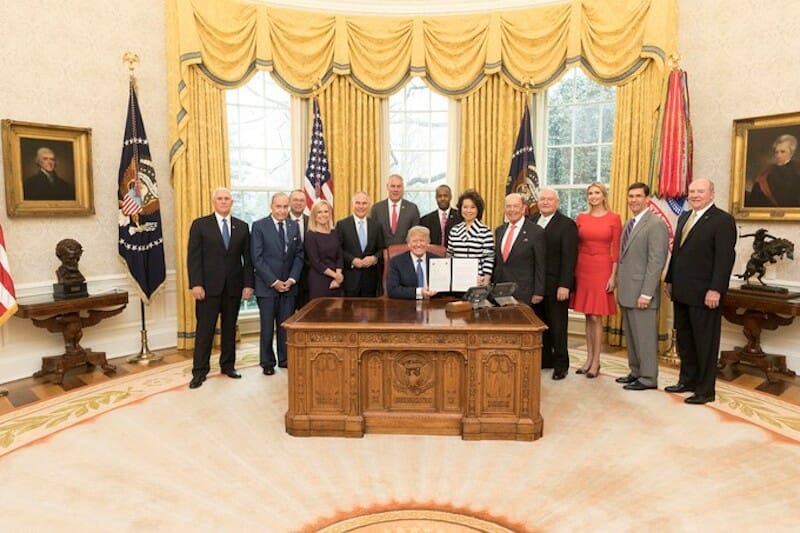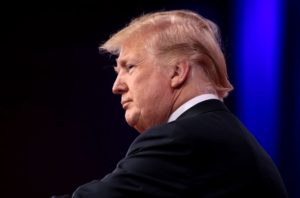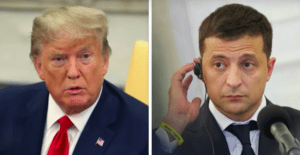Trump Is Failing at the Business of Being President
In all areas—from international and domestic policy to tax reform, from immigration to health care—a common theme has emerged: The president just can't do things competently. In this April 9 photo, the president, surrounded by members of his administration, holds a signed memorandum of understanding regarding protocol for reviewing infrastructure projects. (Shealagh Craighead / White House)
In this April 9 photo, the president, surrounded by members of his administration, holds a signed memorandum of understanding regarding protocol for reviewing infrastructure projects. (Shealagh Craighead / White House)
Trump just can’t get things done, and we need to stop having conversations predicated on the assumption that maybe he can. His dangerous incompetence is currently risking war in the Middle East and Asia, while pitting American against American in ways we haven’t seen in this country since the days of George Wallace.
For example, while citizens and leaders of the western world try to figure out what happened in Helsinki, Trump supporters are in plaintive wail mode: “He just wants better relations with Russia,” they say. “What’s wrong with that?”
In a previous op-ed, I posited three possible reasons for Donald Trump’s behavior relative to Russia: that he’s a witting or unwitting stooge, a wannabe dictator, or desperately broke. Several people noted, in comments to the article, that I’d missed a fourth option: “He’s trying for world peace. Wouldn’t better U.S./Russia relations be a good thing for the U.S. and world peace?”
Of course, it would be a good thing if the U.S. and Russia could get along better. It would be a very good thing.
Relations have been badly strained with Russia ever since we first started pushing NATO onto her borders (in ways that Reagan/Bush had promised Gorbachev would never happen if he’d let the USSR dissolve), and Russia (in part, citing those broken promises) intervened in Georgia, Crimea, and Ukraine.
But Donald Trump is never going to untangle that mess: He simply lacks the skills, and isn’t willing to turn details over to underlings who are competent. Instead, in Bolton and Pompeo, he has selected “hawks” historically hostile to Russia, which may be why he went out of his way to exclude them from his talks in Helsinki. It says a lot when a president is so incompetent he can’t even appoint advisers who agree with his worldview.
He just can’t do things competently.
This pattern has repeated almost daily since the election: consider how his other promises and actions reveal his distressing lack of competence and his failure to understand even the most basic elements of statesmanship and governance.
Donald Trump was elected on an “outsider” platform that, in significant ways, mirrored that of Bernie Sanders and progressive Democrats, earning him large swaths of former Obama voters. But his incompetence has betrayed them, and every world leader, looking on, now knows exactly what they’re dealing with and won’t be suckered the way working-class Americans were in November of 2016.
On entitlements, for example, Trump famously stood on the stage on April 18, 2015 (and multiple other occasions), and said, “Every Republican wants to do a big number on Social Security, they want to do it on Medicare, they want to do it on Medicaid, and we can’t do that and it’s not fair to the people that have been paying in for years and now, all of a sudden, they wanna be cutting it.” (Bernie, of course, didn’t believe him for a second and called him out.)
He can’t do it on entitlements.
On trade, Trump took the position of the Congressional Progressive Caucus—and every U.S. administration from George Washington to Jimmy Carter—when he said he would protect U.S. jobs (and bring home manufacturing jobs) with the use of targeted tariffs. The last time we had a substantive national discussion of the issue was when Ross Perot challenged Bill Clinton and George H.W. Bush for the presidency in 1992, and won over 20 percent of the national vote (correctly) warning of that “giant sucking sound from the south” that would happen if the U.S. signed NAFTA and joined the GATT/WTO.
Most Americans then, and most now, supported targeted tariffs. But Trump’s all over the map, doling out exceptions to tariffs and trade rules when it suits his business interests or when he gets hassled by his wealthy Republican constituency.
Even worse, companies must operate over decades-long periods when planning to invest millions or billions into new manufacturing facilities—but because Trump is doing what he is by executive actions (with a “national security” excuse that will probably be struck down in the courts) instead of moving comprehensive trade legislation through Congress, no company has the assurance that his protective tariffs won’t simply evaporate the day he leaves office.
While tariffs should lead to increases in domestic manufacturing and, thus, more jobs, they aren’t in this case because no company can take that large a risk on such an unstable president with an eccentric policy that has no laws behind it.
He just can’t do it on trade.
On international relations, Trump repeatedly called for better relations with other nations, a goal that (outside of a few hardliners) is widely embraced, at least in the abstract, by both parties and the people of the world (particularly in Europe). Sadly, he’s managed to damage or destroy our relations with all but a handful of autocratic nations, disrespecting and angering American allies who’ve been with us for centuries.
He can’t do it on international relations.
On infrastructure, Trump parroted Bernie in calling for a $1.5 trillion national investment in America’s crumbling infrastructure, repeatedly pointing out that since U.S. infrastructure investments collapsed following Reagan’s huge tax cuts in the 1980s, we’ve let our roads, rails, and airports deteriorate to Third World status. But action since the election? He seems to have forgotten.
He can’t do it on infrastructure.
On issues affecting women and children, Trump called for increased federal spending for child care, child tax credits, and paid maternity leave. The GOP in Congress and the billionaires who fund their campaigns and their voter suppression efforts simply laughed at him.
He can’t do it on family issues.
On health care, Trump continued to insist, even after he was elected, that he would follow the Democrats’ plan to change the law so that Medicare could directly negotiate prescription drug prices (ending a $600 billion windfall for the drug companies inserted by the GOP in 2005), and would provide “insurance for everybody” that was “much less expensive and much better than” Obamacare. Instead, he’s changing the law so your insurance company can once again refuse to pay your bills if they can dig into your records and find any remote evidence of a pre-existing condition. Or simply dump you when you get sick.
He can’t do it on health care.
On taxes, while President Obama signed into law the largest middle-class tax cut in the history of the nation, Trump promised an even bigger tax cut for working people. Instead, he and the GOP handed over $5 trillion in U.S. tax dollars to the billionaire and corporate class, while further depressing wages on working people.
He can’t do it on taxes.
He promised to help out low-income blacks, saying, “What have you got to lose?” Turns out that, along with other low-income minorities and low-income whites, they’re losing a lot, from the right to vote, to essential government help with housing, food, and health care. His white supremacist base seems happy with his “rapist”/“shithole” rhetoric, but they’re being screwed economically by his policies, too.
He can’t do it for low-income folks, people of color, or even the racists among his base.
Trump is breathtakingly incompetent. His businesses have failed repeatedly, foreign oligarchs are bailing him out, and he and Michael Cohen apparently broke numerous U.S. election laws just getting him elected. He couldn’t even run a competent campaign for president, and without “a little (illegal) help from his friends” wouldn’t be in the White House.
He can’t do it through politics.
Trump can’t get his pitiful wall out of his own Republican-controlled Congress, and his brutal child-separation/detention-camp policies have horrified Americans across the political spectrum.
He can’t do it on immigration.
He has utterly failed at health care, to the point that massive increases in insurance prices (and declines in the quality of coverage) are predicted for this winter when rates are reset, further hammering working families who are seeing their wages drop as the natural result of the ongoing Republican War on Unions.
Meanwhile, working-class Americans are further getting hammered with rising gasoline prices as Trump’s newfound Saudi “friends” are laughing all the way to the bank.
He can’t do anything successful for working-class people.
His tax-cut scam will, in the first weeks of October, collide with the Fed’s program of unwinding quantitative easing (QE). The Fed will be looking for purchasers of $800 billion or so of Treasurys on their balance sheet, while the Treasury Department must find buyers for around $1.2 trillion in new debt to continue handing U.S. tax dollars to multinational corporations and billionaires. This, David Stockman told me, will probably push us into the next great depression.
He can’t do it for the economy.
The drug companies are laughing at him (and pretending to go along by holding prices down… for a few months), his infrastructure investment ideas have been killed by McConnell and Ryan, and the GOP won’t even discuss his (Ivanka’s) campaign promises of more governmental help for low-income women and children.
He can’t do it to keep us well.
Which brings us back to why I didn’t include “Trump wanting better U.S. relations with Russia” in my list of reasons he’s so utterly obsequious when it comes to President Putin and Russian oligarchs.
We all would like a win-win of good relations with the world’s second largest nuclear power, but is Donald Trump moving us in that direction? The evidence shouts, “No, he can’t do it.” He’s simply too incompetent.
If Donald Trump—or any president, for that matter—wanted to accomplish a rapprochement with Russia (or any other nation), it must be done systemically.
From the State Department to Congress to our military/intelligence agencies, a president committed to working things out with Russia would be realigning the levers of American power to consistently offer both carrots and sticks, holding a clear-eyed vision of the goals and needs of both nations.
He’d be working with NATO to resolve issues that are troubling to the Russians while, at the same time, informing the American people about the history of this relationship and how it got to this point. (Ironically, that last would give him something to bash Bill Clinton with, as it was on his watch that America broke Bush’s promise to Gorbachev. Trump apparently can’t even competently abuse a political foe.)
Trump grew up in his daddy’s business, which he eventually inherited. As a CEO, he was an absolute autocrat, and never seems to have mastered the necessary arts of compromise and cooperation. His legendary business failures, frauds (yes, with convictions), and bankruptcies attest to his inability to accomplish things—and also to his childlike belief that the way to “get things done” is simply by ordering it so.
That’s not even how competently run companies work, much less entire nations. He’s just a third-level grifter, and just can’t do it.
Trump believes that if the ‘leaders’ of a nation can get along, everything will work out. While there’s actually a long history of personal chemistry between leaders leading to good results, dating back to the first years of our Republic and Jefferson’s relationship with Lafayette, this all has to happen within a much larger and more institutional framework, and Trump can’t do that.
Instead, Trump is handling U.S./Russian relations the way a small-time (non-public company, like Trump’s) CEO would negotiate a deal between their companies. Except that a competent CEO would have had his underlings work out most of the details before the first meeting took place—or at least immediately thereafter.
As if to flaunt his incompetence, Trump hasn’t even yet told his national security team what he agreed to in his private meeting with Putin.
It’s becoming pretty clear that he can’t work out a deal with Russia, and meanwhile North Korea is openly flaunting their defiance of him (despite the superficial changes that have recently occurred). Even Trump’s right-wing allies around the world are laughing at him: Bibi considers him a useful idiot, and the Saudis walked all over him (leading to millions of refugees in Yemen). Erdoğan is ignoring Trump’s pleas to release an imprisoned American pastor, and Xi, other than swapping financing for the Indonesian Trump property for ZTE’s future, is mostly ignoring him.
A few conservatives have tried to spin Trump’s blundering in North Korea and Russia as being on the level of Reagan first “going off script” with Gorbachev, something that did actually happen and eventually turned out well (at least until Milton Friedman’s libertarian “Chicago School boys” began advising the privatization of the former USSR’s assets, but that’s another article).
But the simple reality is that Reagan knew that government doesn’t work like a corporation (unless it’s an autocratic government), and therefore he let competent statesmen and stateswomen around him work out the thousands of small but critical details. Reagan at least had the experience of running California, with the world’s sixth largest economy and layer upon layer of fractious politics; his policies were terrible, but he knew how to get things done. Trump doesn’t.
Trump, in apparent thrall to the idea that he’s America’s “CEO President” or, worse, our soon-to-be Erdoğan or Mussolini, thinks he can have a “secret” conversation with Putin and he’ll just magically charm Russia’s far-more-sophisticated president into supine compliance with U.S. concerns.
Predictably, it doesn’t seem to be working out. He just can’t do it.
Trump should have learned from President Obama’s successful negotiations, leading to world-turning agreements with Iran and Cuba, that there is a way to work things out with former adversaries. Step one, in fact, is to bring in all concerned parties, as Obama did when he successfully worked out the Iran deal with Russia, China, the UK, France, Germany and the UN.
But Trump just can’t learn, and instead, like a spoiled child, he’s now trying to destroy two of the most important bipartisan and multilateral accomplishments of his own country’s early 21st century.
So, yes, we should all hope for better relations between the world’s two great nuclear powers. And if Donald Trump had shown any competence at anything other than demagoguery and race-baiting, it should be included on a list of reasons why he’s working so hard at his relationship with President Putin.
But the last two years tell us that Trump’s Russia outreach is almost certainly more about the money he owes Russian oligarchs than any desire for our two nations to “get along.”
It’s a good thing for world peace and stability to have an American president competent in international relations (and domestic governance, for that matter), and it would be a good thing for the U.S. and the Russian Federation to have a good—or even a great—relationship; most Americans would be grateful and supportive of such a president’s best efforts.
Proof of that is found in the early outreach to Trump from a number of Democrats, from Bernie to Chuck Schumer to Nancy Pelosi, right after the election. They each said, in various ways, “Where he’s wrong, we’ll fight him—but when he’s right, like on trade, infrastructure, or strengthening Social Security, we’re prepared to work with him.” I even said similar things on my radio/TV program, and meant them.
Unfortunately, Donald Trump turned out to be so incompetent that he couldn’t even turn Democrats’ “yes” into anything real, and his promises to do things for average working Americans—or for world peace—were simply lies.
He just can’t do it.
Trump will go down as the most dangerously corrupt and tragically incompetent president in America’s history, and the most it seems we can hope for is that he won’t start World War III or flip America into fascism with his next tweet.
Those are the things, history tells us, an incompetent leader actually can do.
Thom Hartmann is a talk-show host and author of more than 25 books in print. He is a writing fellow at the Independent Media Institute.
This article was produced by the Independent Media Institute.
Your support is crucial…With an uncertain future and a new administration casting doubt on press freedoms, the danger is clear: The truth is at risk.
Now is the time to give. Your tax-deductible support allows us to dig deeper, delivering fearless investigative reporting and analysis that exposes what’s really happening — without compromise.
Stand with our courageous journalists. Donate today to protect a free press, uphold democracy and unearth untold stories.








You need to be a supporter to comment.
There are currently no responses to this article.
Be the first to respond.